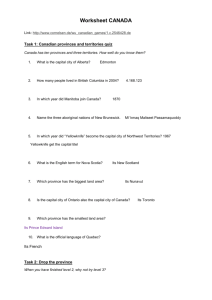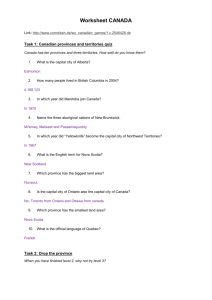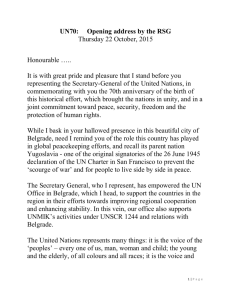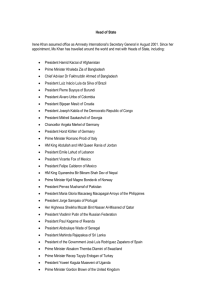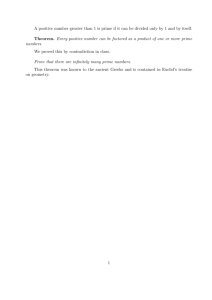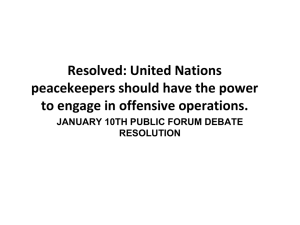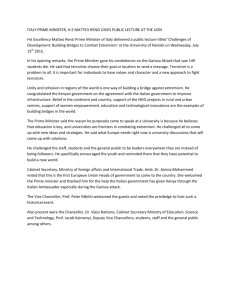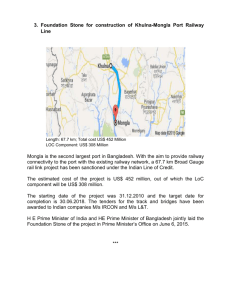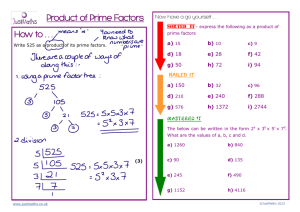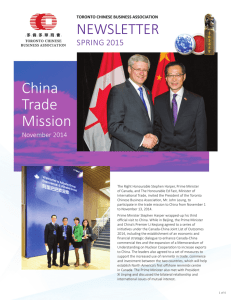Lesson 4 - Trade, Aid, Prime Ministers, & Peacekeeping Outcomes
advertisement
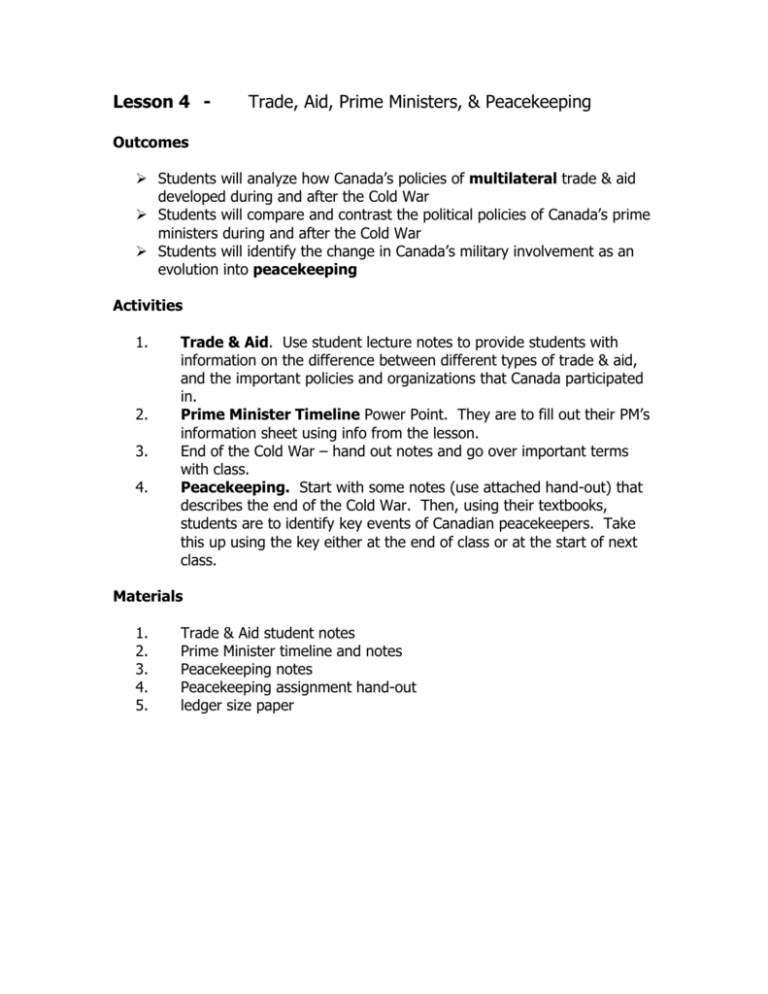
Lesson 4 - Trade, Aid, Prime Ministers, & Peacekeeping Outcomes Students will analyze how Canada’s policies of multilateral trade & aid developed during and after the Cold War Students will compare and contrast the political policies of Canada’s prime ministers during and after the Cold War Students will identify the change in Canada’s military involvement as an evolution into peacekeeping Activities 1. 2. 3. 4. Trade & Aid. Use student lecture notes to provide students with information on the difference between different types of trade & aid, and the important policies and organizations that Canada participated in. Prime Minister Timeline Power Point. They are to fill out their PM’s information sheet using info from the lesson. End of the Cold War – hand out notes and go over important terms with class. Peacekeeping. Start with some notes (use attached hand-out) that describes the end of the Cold War. Then, using their textbooks, students are to identify key events of Canadian peacekeepers. Take this up using the key either at the end of class or at the start of next class. Materials 1. 2. 3. 4. 5. Trade & Aid student notes Prime Minister timeline and notes Peacekeeping notes Peacekeeping assignment hand-out ledger size paper Trade & Aid – Canada’s Foreign Policies Bilateral aid Multilateral aid - Tied aid - aid is given directly from government to government funded by a number of gov’ts, involving large scale programs conditions are attached to aid given The Colombo Plan in the 1950’s our gov’t implemented this plan that built factories and provided infrastructure in Pakistan, India and Sri Lanka (Commonwealth countries) La Francophonie - this international body existed to help French colonies establish social and cultural trade as they started to gain their independence from France and Belgium. (West African nations) Agence de cooperation culturelle et technique (ACCT) - developed by La Francophonie, Canada is one of its founding members. This multilateral organization allows governments to organize their actions and operating budgets to assist West African, French speaking nations. Canadian International Development Agency (CIDA) - created in 1968, this Canadian organization oversees assistance given to developing nations. Official Development Assistance Canadian program that gives financial aid to countries throughout the world. However, from 1991 to 2001, Canadian ODA fell by 34%. We contribute only 0.25% of our GNP while the UN recommends countries to contribute 0.7% Canada Fund for Africa - a $500 million plan that is expected to provide aid to Africa over the next 5 years, and is intended to recognize the right of Africans to take control and ownership of their path to development LINKING AID TO HUMAN RIGHTS By 1986, Canadian focus had shifted in terms of linking aid to human rights. In other words we were not going to support governments that denied basic economic, social and cultural rights to their citizens We have suspended aid when gross human rights abuses have been discovered, but only in the worst cases. Cold War fears also determined our aid policy. Aid to communist governments was terminated when oppressive policies were discovered (Indonesia, Vietnam and Cuba), but aid was maintained when pro-Western states committed similar offenses (Indonesia in 70-80 and Honduras). Essentially, we didn’t want to jeopardize any important economic relations Recently we have taken a more assertive position on human rights but still are reluctant to cut the flow of aid to abusive states that are important economically to us (China, Indonesia). PRIME MINISTERS TIMELINE Prime Minister Party Policies/Events Louis St. Laurent Liberal -saw post war as time to bring ’48 – ‘57 prosperity and unity to Canada -claimed parts of the Arctic, displacing Inuits -oil industry boomed! -often compared to Laurier -initiated the St. Lawrence Seaway project -Trans-Canada highway -trans-Canada natural gas pipeline -responsible for tremendous growth in US investment -1948 encouraged Joey Smallwood (journalist) to organize a petition that would demand a referendum on the status of Newfoundland. On March 31st, 1949, Nfld became our 10th province, and Smallwood its premier John Diefenbaker Cons. -“The Chief” was a powerful ’57 – ‘63 speaker -concerned about US influence in Canada -strongly believed in a united country and protecting those who were less fortunate -raised pensions for the elderly and disabled -gave financial aid to farmers and Atlantic provinces -gave status Indians living on reserves the right to vote in federal elections -1960 brought in the Canadian Bill of Rights putting all basic freedoms into law Lester B. Pearson ’63 – ‘68 Lib Pierre Elliott Trudeau ’68 – ‘84 Liberal -won Nobel Peace Prize as Minister of External Affairs in 1957 -sought to improve French/English relations -appointed a Royal Commission on Bilingualism and Biculturalism -introduced Canada Pension Plan -introduced Medicare for all Canadians -thought it important to cut Canada’s symbolic tie with Britain, and the flag debate ensued. -1965 – single red maple leaf was our official flag -introduced a trial abolition of capital punishment -easier divorce laws -youthful, casual and stylish! -drove fast cars, outdoorsman -believed gov’t duty was to protect peoples’ rights -strong believer in individual freedom -1970 – officially recognized the People’s Republic of China -wanted Canada to be less dependent on the US (sleeping next to an elephant speech) -scale back our participation in nuclear arms race (dismantled Bomarc missile sites) -cut national defense budget -increased aid with poor countries Brian Mulroney ’84 – ‘93 Cons. Kim Campbell ’93 – ‘93 Jean Chretien ’93 – ‘03 Cons. Lib -wanted to forge closer links with the US -close friendship with Reagan -said no to US “Star Wars” program but left door open for private companies to get involved -1989 – established the Free Trade Agreement with US, removing tariffs on goods -1992 – expanded this program by including Mexico (NAFTA) -facing a massive federal debt created during the 70’s, introduced the GST, took away family allowances and old age pensions from the wealthy -believed that strengthening businesses in the private sector would help reduce the debt -short lived! Defeated by the Liberals later that year -came to power facing a staggering debt of $466 billion! -goal was to create jobs -Finance Minister Paul Martin recommended cutting federal spending (40 000 gov’t jobs were cut) -cut education, health care, welfare -hospitals closed, university tuition rose, homelessness rose -1998 – Chretien’s gov’t created a surplus! -Quebec separatism sentiments increased (Bloc Quebecois became official opposition in 1993) -Reform party emerged out of PRIME MINISTERS TIMELINE Prime Minister Policies/Events Louis St. Laurent ’48 – ‘57 John Diefenbaker ’57 – ‘63 Lester B. Pearson ’63 – ‘68 Pierre Elliott Trudeau ’68 – ‘84 Brian Mulroney ’84 – ‘93 Kim Campbell ’93 – ‘93 Jean Chretien ’93 –‘03 -short lived! Defeated by the Liberals later that year Socials 11 1. Name __________________________ Block _______ CANADA AS PEACEKEEPERS What incident marked the world’s first peacekeeping mission? Changing role of peacekeepers train and restructure local police conduct elections facilitate the return of refugees monitor human rights promote sustainable democracy and economic development humanitarian intervention Canadian peacekeepers overseas over 100 000 Canadians have served as peacekeepers in the 2nd half of this century (Cyprus, Middle East, Haiti, Bosnia, Cambodia and others) Complete the following tables outlining 5 recent overseas conflicts: The Persian Gulf War p. 274 When: Where: Action Taken: Response: Outcome: So What? (Significance/Impact/Consequences) Genocide in Rwanda p. 275 Tutsi vs Hutu So What? (Significance/Impact/Consequences) Romeo Dallaire Disgrace in Somalia, 1992 p. 276 Operation “Restore Hope” The Controversy: So What? (Significance/Impact/Consequences) Civil War in Yugoslavia p. 277 Background: So What? (Significance/Impact/Consequences) Milosevic’s Actions: NATO Response: Outcome: Attacks of 9/11 p. 278 Background: War in Afghanistan The Iraq War So What? (Significance/Impact/Consequences)
